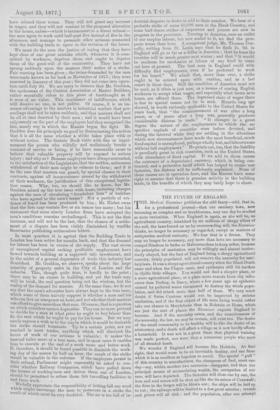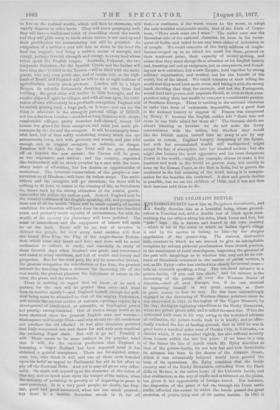THE FUTURE OF ENGLAND.
THE Medical Examiner publishes the odd fancy—odd, that is, for a professional journal—that our sanitary laws, now becoming so complex and so troublesome, may one day be studied as mere curiosities. When England is again, as she will be, an agricultural country, inhabited by six millions of sleepy tillers of the soil, the laws forced on us by overcrowding will, the Examiner thinks, no longer be necessary or regarded, except as matters of antiquarian medical curiosity. We fear that is a dream. They may no longer be necessary, any more than laws are necessary to compel Hindoos to bathe or Mahommedans to keep sober, because the principles of sanitation may be willingly and almost instinc- tively obeyed, but the fact of England being a sleepy agricultural country, thinly populated, will not remove the necessity for sani- tarylaws. It was a sleepy agricultural country when the Black Death came and when the Plague came, and epidemics still hit hardest in idyllic little villages. You would not find a sleepier place, or a more agricultural place, or a place more remote from city influ- ences than Terling, in Essex, where a few years ago an epidemic caused by polluted water threatened to destroy the whole popu- lation, and did attack more than half of them. We very much doubt if Swiss Cantons would not be improved by stricter sanitation, and if the first object of life were living would rather take our chance in Marylebone than in Holstein or IIesse, which are just the sort of places the Examiner expects England to become. And if the necessity exists, and the consciousness of the necessity, the law, we may be certain, will exist too. The desire of the small community to be healthy will be like the desire of an aristocracy, and a death will affect a village as it now hardly affects a household. It was not in a great State that physical training was made perfect, nor were they a numerous people who most of all dreaded death. We wonder if England will become like Holstein. At first sight, that would seem to be an inevitable destiny, and one from which it is as needless as hopeless to recoil. The special " pull " of this country in manufactures, the cheapness of fuel, must one day—say, within another two centuries—disappear, and then our principal means of accumulating wealth, the occupation of our race, will have departed. The factories will close one by one, the iron and coal mines will be shut up like the tin mines of Cornwall ; the fires in the forges will be blown out ; the ships will be laid up to rot ; the railways will be limited to a few great arteries ; rentals and prices will all sink ; and the population, after one attempt to live on the realised wealth, which will then be enormous, will rapidly disperse to other lands. They will know geography well, they will have a traditional habit of stumbling about the world, and they will glide away to lands where nature is not used up and their predilection for accumulating can still be gratified. An emigration of a million a year will thin us down to the level the land can support, and bring a sudden access of strength and energy, perhaps feverish strength and energy, to every land whose rulers speak the English tongue. Australia, Polynesia, the two temperate Americas—for the Spanish Creole and the Indian will have long since yielded to the Teuton—will be filled with the immi- grants, who may even settle also, and of course rule, on the high- lands of Brazil, and England will be left to six or eight millions of agriculturists, mostly stock-growers. London will be a huger Bruges, its suburbs fortunately decaying at once, from bad building ; the great cities will decline to little boroughs, and the smaller cities will again be villages, and with all seas open, the culti- vation of corn will scarcely be a profitable occupation. England will be mainly grazing land, a huge park, as it were—you can see the thing in miniature in the strangely pastoral village of Millhill, not ten miles from London—studded at long distances with sleepy, comfortable villages, pretty churches half-disused, roomy old houses too grand for their occupiers, and ruins just made pic- turesque by the ivy and the creepers. It will be a strangely beau- tiful land, full of that softly undulating scenery which the eye permanently loves, rich with greenery and woods, and just wild enough not to suggest savagery, or solitude, or danger. Taxation will be light, for the Debt will be gone, shaken off as beyond the new means ; the Throne will be gone, as too expensive and useless ; and the country, organised like Switzerland, will be thinly peopled by a race with the here- ditary habit of education, but few desires or opportunities of excitement, The inherent conservatism of the people—a con- servatism as of Hindooa—will have its fullest scope. The ambi- bitious and the energetic will go elsewhere, for there will be nothing to do here, to return in the evening of life, as Scotchmen do, drawn back by the strong attraction of the restful, gentle, uneventful life within the endless park. Indeed, England may be the country residence of the English-speaking, old, and prosperous from out of all the world. There will be much equality of mental condition, for education will have done its work for two hundred years, and probably much equality of circumstance, for with the wealth of the country the plutocracy will have perished. The sense of leisureliness and the enjoyment of leisure will again be on the land. There will be no fear of invasion to distract the people, for over every local emblem will float the bread Blue Flag, the Flag of the Anglo-Saxon Federa- tion, which none may insult and live ; and there will be much inclination to culture, to study, and especially to study of those feverish days when England was great, and reverenced and hated in every continent, and full of wealth and luxury and pauperism. But for the most part, life will be somewhat bovine, the greatest occupation the manufacture of fine kin°, the greatest interest the watching from a distance the throbbing life of the real world, the greatest pleasure the enjoyment of nature in the trees, the grass, and the clouds.
There is nothing to regret that we know of in such a picture, for the race will be greater than over—and what deem its habitat signify ?—and England herself, though her poli- tical being must be absorbed in that of the mighty Federation, will remain the ancient mother of nations,—perhaps regain, by a development of intellectual, or scientific, or theological power her prestige among mankind. Out of such a sleepy world as we have sketched came the greatest English man and woman— Shakespeare and George Eliot—and why should the old conditions not produce the old effects ? It was after dominion perished that Italy conquered Art, and threw far and wide over mankind the enduring Papal chain. But will it go so ? Possibly it will. There seems to be some instinct in the popular mind that it will, for the curious prediction that England is becoming a larger Holland has been repeated until it has obtained a general acceptance. There are far-sighted states- men, too, who think it will, and one of them even founded upon his belief an appeal to Parliament for aid in his effort to pay off the National Debt. And yet it may all go so very differ- ently. So much will depend upon the character of the rulers of that day, and so much more upon the temper of the nation, when the necessity of perishing in poverty or of departing in peace is once perceived. It is a very good people, no doubt, the Eng- lish, good and good-humoured, when not too much pressed ; but there is a terrible Berserker streak in it, for All that,—a readiness, if the worst comes to the worst, to adopt the only truthful aristocratic motto, that of the Earls of Crans- toun, "Thou shalt want are I want." The writer once saw the Berserker side of the national character let loose in the recon- quest of India, and failed to see any trace either of indecision or of scruple. We could conceive of the forty millions of Anglo- Saxons cooped up in an island too small for them, pressed on their tenderest point, their capacity of money-getting, and aware that they must change their situation or let English history end, bursting out not as emigrants, but as conquerors, and found- ing not new coloniess, but a new Empire, held together by strong military organisation, and worked not for the benefit of the world, but of the island. We could conceive of their telling the world that they must have more room, and taking it with the strong hand, deciding that they, for example, and not the Portuguese, would hold and govern and populate Brazil, or even in their exas- peration using their last wealth to conquer a considerable portion of Southern Europe. There is nothing in the national character to make that form of euthanasia impossible, and a good deal in the national history to suggest it. France was conquered by Henry V. because the English nobles felt "there was not room in one little island for them all." The German chiefs are always taunting us because we do not make the Army conterminous with the nation, but whether they would like the British nation turned into an army is not by any means so certain. England hungry, despairing of the future, but with her accumulated wealth still undispersed, might accept the fate of absorption into her kindred nations ; but she might also become the most aggressive and the most dangerous Power in the world,—might, for example, choose to make it her business and work in the world to govern Asia, not merely to keep up the Roman Peace, as she does in India, but to govern the continent in the full meaning of the word, taxing it in compen- sation for the benefits she conferred. A slow and gentle decline is possible, but we are the children of Odin, and it was not thus their instinct told them to die.































 Previous page
Previous page